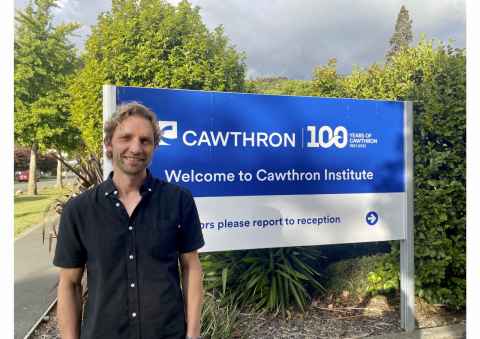Molecular Scientist
Olivier wanted to maximise his chances of finding work as a researcher after graduation, and feels the Cawthron Institute played a big role in achieving this goal.

Career: Molecular Scientist at Cawthron Institute
Programme: Doctorate in Biological Sciences.
“I love learning new things and expanding my horizons. Over the years and as I have travelled, I have also learned to appreciate the gift of nature, becoming a proponent of environmental conservation and protection. Pursuing a PhD in Biological Sciences was a great way for me to combine these interests. I officially graduated with my PhD in June 2019.
“My thesis focused on development of eDNA/eRNA based molecular monitoring tools to assess anthropological impacts. Throughout my PhD I was based full-time at Cawthron Institute, NZ’s largest independent science organisation. It was a great opportunity to be surrounded by great scientists and technicians with heaps of hands-on experience. One of the biggest upsides was being able to easily get guidance from my supervisors and other researchers working on site.
“I really liked the flexibility of being able to carry out my research in a working environment where I could get a feel for what my career could be like after I graduated, and yet also have access to student programs and facilities through the University of Auckland.
“After I graduated, I had the chance to secure a one-year post-doctoral position at the University of Hawaii at Manoa, working on a deep-sea project aimed at better characterizing and understanding the macrofaunal communities inhabiting the seafloor of the Clarion-Clipperton Fracture zone. Soon after, I had the opportunity to travel to Norway and work as a post-doctoral fellow at the Institute of Marine Science in Tromsø, developing novel molecular tools to monitor the impact of fish farm activities. These two experiences were fantastic opportunities to develop my network and experience different cultures and environments. Ultimately, these post-docs led me to secure a position as a molecular scientist at the Cawthron Institute, where my science adventure initially started!
“I grew up in a small village between Montreal and Québec city, in the Province of Québec in Canada. My PhD was primarily funded by the ‘Fonds de recherche du Québec – Nature et technologies’ a 3-year scholarship from my home Province in Canada. While modest, this scholarship offered great flexibility in terms of subject and location and gave me all the latitude I needed to develop my own research proposal. During my studies I was also awarded the Puke Ariki George Mason charitable trust scholarship. I also used the International Student Support team to help me with immigration issues, and postgraduate support and services, which really helped me when I needed to submit my PhD thesis.
“I was in my early thirties when I started my PhD and wanted to maximise my chances to quickly find work (like these post-docs) as a researcher after I graduated. The Cawthron Institute definitely helped with that, so I encourage prospective students to consider the pros and cons of being located off campus and think about their priorities, based on their personal situation.”
We're always looking for stories to share from our passionate Science students.
If you have a story, we'd love to hear from you. Email science-web@auckland.ac.nz.